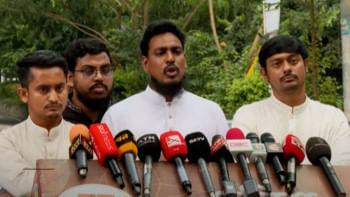Mourning the death of visionaries

Today we mourn the loss of some of the brightest minds of our country. We mourn their cruel murder in the hands of a regime that hoped to destroy the future of a country, to shatter a nation's collective spirit, to permanently maim the intellectual sphere of a yet to be born nation. So insecure were the occupying forces about the abilities and united might of a free Bangladesh that they avenged their failure by systematically rounding up, torturing and killing the torchbearers who could have led Bangladeshis to a path of resurgence and recovery.
Contrary to the expectations of the Pakistani regime, Bangladesh survived this blow, and it continues to survive several other attacks on its existence. The scars, however, remain, as does the question: How different would things be if we hadn't lost the free thinkers who seeded the very idea of nationalism in every Bangalee heart?
We know that every one of the martyred intellectuals was instrumental in ensuring Bangladesh's victory in our fight for identity and existence. Not all of us are aware, however, that they were all remarkably talented in their respective professional fields. It wasn't chance that brought them to the attention of the Pakistani dictators; they were chosen because they were the cream of the crop, representing the educated, cultured and erudite section of a subjugated population.
Shahidullah Kaiser's novel Sangsaptak is considered to be a seminal work of Bangladesh's literary canon. It's therefore interesting that Kaiser credits Ayub Khan for his foray into writing as he famously said that he became a novelist only because the then dictator sent him to jail. Before playing an important role in the Language Movement, Kaiser was a journalist, beginning his career at The Daily Ittefaq in 1949. For his role in the Language Movement, he was first arrested by the Pakistani regime in 1952 and in the next 10 years, he spent a total of eight years in prison. His writing career truly began behind the bars as it is there that he penned some of his most remarkable plays, short stories and novels. Almost all his works, including Sareng Bou, Rajbondir Rojnamcha, Timir Belay, Naam Nei and Jadu-i Halwa, were written in confinement. The only book that he wrote after being freed from prison was the unfinished novel Kobey Pohabe Bibhabori - an account of the horrors inflicted by Pakistani forces. He would write parts of the novel during the night and bury the copies in the courtyard of his residence before dawn broke, digging them out again when night fell. He was tragically killed before finishing the four-part novel.
Munier Chowdhury is mostly remembered as one of the most outspoken critics of the Pakistani regime, but not many people know that Chowdhury redesigned and modernised the keyboard of the Bangla typewriter in collaboration with Remington typewriters of then East Germany in 1965. Over the years, his creation - the 'Munier Optima' keyboard - paved the way for further developments in improving the Bangla keyboard.
Always a revolutionary, Chowdhury was jailed for two years for his involvement in the Language Movement in 1952. Interestingly, even though he was allowed to continue his education at Dhaka University, Chowdhury was expelled from Salimullah Hall, his residential dorm, because of his involvement in leftist politics. This led to a new era in Chowdhury's life as he explored his literary talents, initially by writing plays for Dhaka Radio to pay for his education, and later by penning some of the most influential plays in the country's history. Munier Chowdhury is deservedly called the father of modern drama in Bangladesh; in fact, his play Kobor was performed by prisoners when he was in jail to commemorate the first anniversary of the Language Movement on February 21, 1953. He continued to write even after being freed from prison, some of his most notable works being, Roktakto Prantor, Chithi and Polashi Barrack O Onyanno.
On February 23, 1948, Dhirendranath Datta, a martyr of 1971, made a compelling speech calling for Bangla to be made into one of the official languages of Pakistan at the Pakistan Constituent Assembly in Karachi. It was the first formal call for Bangla to be declared a state language and this demand led to the Language Movement of 1952. Datta's demand was met with contempt from the Pakistan government, and he was targeted as a threat to the regime. Datta, a lawyer by profession, was a lone ranger, whose plea was not supported by the majority of Bengali leaders at that time but he could foresee that the future of the Bengali people would remain uncertain and under the regime's control, until the demand for their language to be officially acknowledged was met.
A renowned cardiologist and medical researcher, Dr Mohammad Fazle Rabbee could have spent his life in comfort but decided to forego professionally rewarding opportunities for the welfare of the public. A student of Dhaka Medical College, Rabbee became the Registrar of Medicine at the 'ripe old' age of 27 and earned a couple of MRCP degrees in cardiology and internal medicine within two years. After completing his graduation, Rabbee worked at the Hammersmith Hospital and the Middlesex Hospital in London but left his flourishing career for his country to which he returned in 1963.
After returning home, Rabbee became further involved in promoting the idea of good medical care for free but instead of being lauded, he was imprisoned by the Pakistani army for his "provocative speeches." Rabbee didn't just limit his ideals to words, he acted on them. During the Liberation War, Rabbee provided medical care, monetary support and shelter to freedom fighters and survivors of the war. His confidence in his cause can be best exemplified by his refusal to accept the Best Professor Award from the Pakistani government in protest of their treatment to East Pakistan and its people. Apart from being a doctor, Rabbee was well known and respected for his research works, namely "The Tropical Pulmonary Eosinophilia" and "A Case of Congenital Hyperbilirubinaemia." His works were published in the British Medical Journal and The Lancet, one of the world's oldest general medical journals.
Musician Altaf Mahmud always attempted to reveal the atrocities of a violent administration through his compositions. Mahmud was even invited to participate at the Vienna Peace Conference in 1956 but was unable to attend as his passport was confiscated by the Pakistani government. It was not just Mahmud's outspoken nature but also his inarguable talent that frightened an entire regime. How could they underestimate a man who had the ability to move a nation to action with a single song? Even today Mahmud's eternal composition, Amar Bhaiyer Rokte Ragano, takes us back to the struggle of our freedom movement. Apart from the revolutionary Jibon Theke Neya, Mahmud, a protégée of music legend Ustad Abdul Kader Khan, composed music for 19 films, including Kaar Bou, Satyer Joy and Ami Manusher Bhai Spartacus.
Professor Govinda Chandra Dev was the living embodiment of philosopher Paul Kurtz's statement that philosophers shouldn't just make obscure references to the works of other philosophers but "descend into the concrete world of human practice and belief, sweat and toil like the rest of humanity." He believed that philosophy should have a connection with reality instead of dwelling in abstractions. Despite an impoverished childhood spent in the care of Christian missionaries, Dev proved his mettle when he earned the top position in his Masters degree in Philosophy from Calcutta University. He introduced the idea of Synthetic Philosophy in the subcontinent, which stressed that it was possible to believe in the ultimate perfection of humanity on the basis of advanced scientific conceptions, focusing on its practical application. Dev's popularity transcended borders; he taught at the Wilkes-Barre College in Pennsylvania in the US as a visiting professor and his popularity became such that some of his students founded the Govinda Dev Foundation for World Brotherhood to promote his philosophy of humanism. Some of his notable books include Amar Jibandarshan, The Philosophy of Vivekananda and the Future of Man and Buddha: The Humanist.
Around 991 academics, 13 journalists, 49 physicians, 42 lawyers and 16 others from various cultural and intellectual sections of the country were savagely killed in the 1971 carnage. We can never forget the contributions of other martyred intellectuals such as Jyotirmoy Guhathakurta, Ghiasuddin Ahmed, Anwar Pasha, Dr Serajul Haque Khan, Humayun Kabir, Jogesh Chandra Ghose, Selina Parveen and numerous others who impacted the birth of a nation and could have contributed to the growth of Bangladesh had they lived. These visionaries may be long gone but their ideals, dreams and contributions still hold relevance. It is now our responsibility to ensure that our country reflects the values of fairness, tolerance and secularism that they gave their lives for. It is our responsibility to make sure that our country doesn't spiral down to the age of bigotry and militancy that existed during the oppressive regime that threatened our very existence. It is our responsibility to fight the forces that want to take us back to an era of confusion, intolerance and chaos that shook the core of our being 44 years ago. This is the very least we owe them.
The writer is Senior Editorial Assistant, The Daily Star.

 For all latest news, follow The Daily Star's Google News channel.
For all latest news, follow The Daily Star's Google News channel. 



Comments